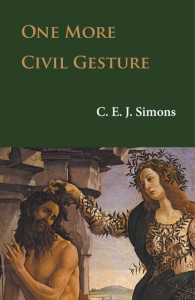 The poems in One More Civil Gesture, the first full collection by C. E. J. Simons, frequently take their subjects from singularities of nature and art – things that are wonderful not because they are unusual or rare, but because they deserve wonder, no matter how familiar: animal life; the seasons; family; myth; well-known Shakespeare plays. They aim, as Geoffrey Hill has said, to restructure banality into beauty without denying the banal. Simons wrote much of the book in Japan, where he has lived since 2006, and in the interstices of frequent travel in Asia, particularly to Burma, China, and Mongolia; the cultures and landscapes of these places, as well as of England and his native Canada, inform the work. The gestures of these poems are civil in two senses: in their bold and exciting use of inherited forms, whether Western or Japanese; and in their aspiration to eschew self-expression in search of representations of the human capacity to engage with the other – to be civilised through immersion in the unknown.
The poems in One More Civil Gesture, the first full collection by C. E. J. Simons, frequently take their subjects from singularities of nature and art – things that are wonderful not because they are unusual or rare, but because they deserve wonder, no matter how familiar: animal life; the seasons; family; myth; well-known Shakespeare plays. They aim, as Geoffrey Hill has said, to restructure banality into beauty without denying the banal. Simons wrote much of the book in Japan, where he has lived since 2006, and in the interstices of frequent travel in Asia, particularly to Burma, China, and Mongolia; the cultures and landscapes of these places, as well as of England and his native Canada, inform the work. The gestures of these poems are civil in two senses: in their bold and exciting use of inherited forms, whether Western or Japanese; and in their aspiration to eschew self-expression in search of representations of the human capacity to engage with the other – to be civilised through immersion in the unknown.
April 2015. Paperback. 84 pages. 8.5 x 5.5. ISBN 978-4-907359-08-9.
Click here to read a downloadable PDF of a sample of this book.
Click here to buy from Amazon.co.uk; click here to buy from Amazon.com; or click here to buy from Amazon.co.jp.
With something of Ted Hughes’s unflinching power, allied to a troubled compassion, Chris Simons draws on a richly diverse range of subjects in poems that deal with the devastations and losses of the present, the past, and prehistory. Rhyme and violence are yoked together as ‘Time picks history clean as a carcass’, a cameraman earns a tough, affecting elegy, ‘the anthropomorphic lie’ confronts ‘the truth in the hawk’s eye’, and the civil gesture of poetry encounters much that threatens its attempted composure. This is an impressive first volume. – Michael O’Neill
In One More Civil Gesture Christopher Simons explores the strictures of civilisation on our natural state: these are layered poems, informed by the poet’s travels – both physical and in the metaphorical ‘realms of gold’ – drawing on language, literary references, the sublime and the prosaic to express the tensions between the sentient and the rational. A collection of poems which demand multiple readings: Simons gives voice to a contained passion and a new edge to contemporary formal writing. – Claudia Daventry
Beneath the formal gestures in C. E. J. Simons’ debut collection, there resides a great sense of loss that threatens to undo each poem from within. Each gesture, each line, is an attempt at domesticating various forms of grief – for lost places, for the past, for decays; the poet mourns for illuminating moments that leave him ‘more full / of love for the old lie’. These poems are an attempt at holding on to details – of a turtle’s body, sea urchins, his lover – trying to resist as ‘time picks history clean as a carcass / scavenged down to its armature’. They resist forgetfulness. They evoke. They provoke. One More Civil Gesture is a work of beauty. – Mariko Nagai
Performance and the stage provide the setting for many of the poems here, and theatrical stylisation – the way that overt artificiality can heighten our sense of the real – is strongly reflected in Simons’ deft handling of formal structures. Like the black-clad kurogo of Kabuki theatre, he carries a light close in to his subjects, encouraging us ‘to look straight through his mimic shadow-play, / so each of us may slowly learn to see / our shadows.’ – Alan Buckley